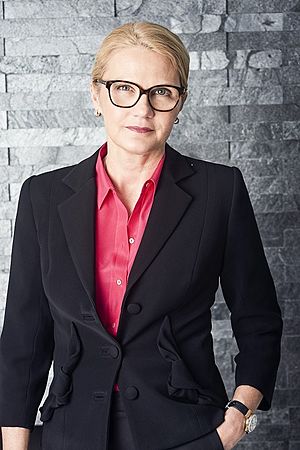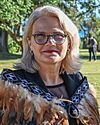Chief Justice of New Zealand facts for kids
Quick facts for kids Chief Justice of New Zealand |
|
|---|---|
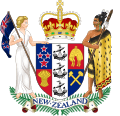
Judiciary of New Zealand
|
|
| Style | The Right Honourable |
| Nominator | Prime Minister of New Zealand |
| Appointer | Governor-General of New Zealand |
| Term length | No set term, though retirement is mandatory at age 70 |
| Formation | 5 February 1841 |
| First holder | Sir William Martin |
| Salary | $578,000 |
The Chief Justice of New Zealand (in Māori, Te Kaiwhakawā Tumuaki o Aotearoa) is the main leader of New Zealand's court system. This person leads the Supreme Court of New Zealand. The Chief Justice also leads the courts in Tokelau, a small group of islands linked to New Zealand.
Before 2004, the Chief Justice led the High Court of New Zealand. They were also a member of the Court of Appeal of New Zealand. The role of Chief Justice is set out in the Senior Courts Act 2016. This law says the Chief Justice is "senior to all other judges."
The Chief Justice is like the team captain among the Supreme Court judges. They are the "first among equals." This means they are equal to other judges but have a special leadership role. They also step in for the Governor-General of New Zealand if that person is away or unable to do their job. When this happens, the Chief Justice is called the "administrator of the Government."
The Governor-General chooses the Chief Justice. This choice is made after getting advice from the Prime Minister of New Zealand. The current Chief Justice is Dame Helen Winkelmann. She started her role on 14 March 2019. She took over from Dame Sian Elias, who retired at age 70.
History of the Chief Justice Role
From 1841 to 1957, the Chief Justice was clearly the most important judge in New Zealand. They worked in the old Supreme Court. This court is now called the High Court of New Zealand. Before 1957, all judges of the Supreme Court were also part of the Court of Appeal.
In 1957, a permanent Court of Appeal was created. This new court had its own leader, called the President. The Chief Justice's role then became more like the leader of the High Court. They were in charge of the High Court, which is the biggest part of the senior court system. However, they no longer controlled the main appeals court in New Zealand, which was the Court of Appeal.
This changed in 2004. New Zealand stopped sending its final court appeals to the Judicial Committee of the Privy Council in London. Instead, the Supreme Court of New Zealand was created. This new court became the highest court for New Zealand. When the Supreme Court was set up, the Chief Justice became its leader.
Who Were the Chief Justices?
| No. | Image | Chief Justice | Started Role | Left Role |
|---|---|---|---|---|
| 1 | 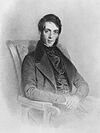 |
Hon. Sir William Martin | 5 February 1841 | 12 June 1857 |
| 2 | Hon. Sir George Arney | c. 1858 | 1875 | |
| 3 | 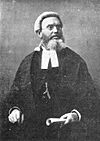 |
Hon. Sir James Prendergast GCMG | 1 April 1875 | 25 May 1899 |
| 4 | 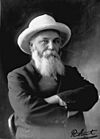 |
Rt Hon. Sir Robert Stout GCMG | 25 May 1899 | 31 January 1926 |
| 5 | 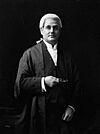 |
Hon. Sir Charles Skerrett KCMG KC | 1 February 1926 | 13 February 1929 |
| 6 | 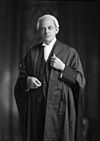 |
Rt Hon. Sir Michael Myers GCMG KC | 3 May 1929 | 7 August 1946 |
| 7 | 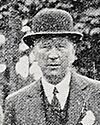 |
Rt Hon. Sir Humphrey O'Leary KCMG KC | 12 August 1946 | 16 October 1953 |
| 8 | 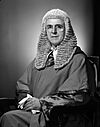 |
Rt Hon. Sir Harold Barrowclough KCMG CB DSO MC ED | 17 November 1953 | 17 January 1966 |
| 9 | Rt Hon. Sir Richard Wild GBE KCMG QC | 18 January 1966 | January 1978 | |
| 10 | Rt Hon. Sir Ronald Davison GBE CMG QC | 3 February 1978 | 4 February 1989 | |
| 11 | Rt Hon. Sir Thomas Eichelbaum GBE QC | 6 February 1989 | 16 May 1999 | |
| 12 | 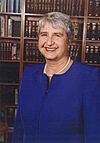 |
Rt Hon. Dame Sian Elias GNZM PC QC | 17 May 1999 | 13 March 2019 |
| 13 | Rt Hon. Dame Helen Winkelmann GNZM | 14 March 2019 | present |
 | Victor J. Glover |
 | Yvonne Cagle |
 | Jeanette Epps |
 | Bernard A. Harris Jr. |


